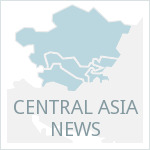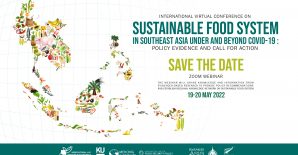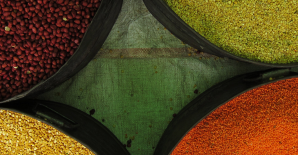News
Russian Farmers Suffering As COVID-19 Pandemic Keeps Central Asian Workers At Home
One of the primary concerns for Central Asian countries during COVID-19 has been the freezing of remittances from Central Asian migrant workers, especially those who depend on seasonal work in Russia. Another dimension of the issue is the effects on the Russian agricultural sector. Russian farms largely depend on labor from Central Asian migrants, and many are struggling to find non-migrants who are able to fulfill the same level of productivity at low cost. This may have significant impacts on food value chains that begin with Russian agriculture. - RFE/RL
World Bank Helps Tajikistan Inform Public on COVID-19 Risks
In addition to adequate medical supplies and support for social welfare, maintaining timely communication and education is vital for containing COVID-19. To that end, the World Bank is implementing its SMS-based platform "Mobile Engage" in Tajikistan, which will deliver information about the risks and ways to minimize them to the phones of Tajik citizens. Additionally, a monthly phone-based survey collected from over 1,300 households across Tajikistan called "Listening to Tajikistan" will allow the Government to stay informed on impacts of the pandemic and to respond appropriately with policy initiatives. - The World Bank
ADB, Electric Networks of Armenia Sign $20 Million Working Capital Support Loan
The ADB and the Electric Networks of Armenia Closed Joint-Stock Company (ENA) have signed a $20 million loan to ensure energy supplies as efforts to combat and contain COVID-19 continue. ENA maintains Armenia's entire enrgy distribution network and provides services to more than 1 million customers. This liquidity injection will allow for the continuation of quality services, which will benefit all Armenians. - ADB
The United States provides COVID-19 testing supplies to Uzbekistan
This week, USAID donated enough supplies to conduct 15,000 COVID-19 tests, and another 10,000 tests will arrive in Uzbekistan in the coming weeks. These tests will allow Uzbekistan to expand its capacity to identify and treat COVID-19 cases. - USAID
Global Economic Prospects: Europe and Central Asia
This short brief provides the economic outlook for Central Asian countries, assuming that government restrictions meant to address COVID-19 are gradually lifted by the start of the second half of the year. Recessions in all countries are expected, but otherwise it is difficult to predict the severity of economic impacts. Particularly important factors to consider are remittances, as well as the spread of infections and restrictive measures implemented in response. - The World Bank
Analysis & Related Information
COVID-19 Analyses: IFPRI Blogs
IFPRI is facilitating an ongoing blog series to discuss COVID-19 as it relates to food security and development at the global, regional, and country levels. Though some concern specific countries, the insights are applicable to others as the world collectively experiences the impacts of the pandemic. This week's first blog discusses how COVID-19 has disrupted dairy value chains in Ethiopia. Another blog explores access to water in the context of COVID-19.
IFPRI Virtual Events
IFPRI has been hosting virtual events to discuss various issues related to food and agriculture policy. Videos like this will periodically be posted publicly after being streamed live, and will include presentations from researchers, discussion between researchers, and Q&A. On Thursday, June 11, from 9:30am-10:45am EDT, IFPRI will host a policy seminar discussing social safety nets in relation to food security during COVID-19.
How the Great Lockdown Saved Lives
One of the most difficult aspects of addressing COVID-19 is that it is easy to see the negative effects of prevention measures like quarantine, but it is difficult to see the benefits of those measures. That is because a successful scenario is one in which new COVID-19 cases are stopped, and determining the counterfactual can be complicated. This article attempts to estimate how many lives have been saved by containment measures, and which measures have been most effective. - IMF Blogs
Publications & Reports
Changes in area and water volume of the Aral Sea in the arid Central Asia over the period of 1960–2018 and their causes
Yang, X. et al. 2020, CATENA, Vol. 191, Early Online Version.
Covariate Shocks and Child Undernutrition : A Review of Evidence from Low- and Middle-Income Countries
Debebe, Z., Raju, D. 2020. Policy Research Working Paper No. 9273, Washington D.C.: World Bank Group.
Effect of Non-formal Experiential Education on Personal Agency of Adolescent Girls in Tajikistan: Findings from a Randomized Experimental Study
Karmli, L. et al. 2020. Global Social Welfare, Vol. 7, No. 2, pp. 141-154.
Investment risk and natural resource potential in “Belt & Road Initiative” countries: A multi-criteria decision-making approach
Hussain, J. et al. 2020. Science of the Total Environment, Vol. 723.
Spatiotemporal variability of the precipitation concentration and diversity in Central Asia
Yang, T. et al. 2020. Atmospheric Research, Vol. 241. Early Online Version.
The Important Role of Equivalence Scales : Household Size, Composition, and Poverty Dynamics in the Russian Federation
Abanokova, K. et al. 2020. Policy Research Working Paper No. 9270, Washington D.C.: World Bank Group.
Useful Links & Commentaries on Research Methods, Data & Publications
COVID-19 widens gulf of global data inequality, while national statistical offices step up to meet new data demands
Haishan Fu & Stefan Schweinfest. 2020. Data Blog, World Bank Blogs.
What would the world look like if all development data were as timely as COVID-19 case data?
Daniel Mahler et al. 2020. Data Blog, World Bank Blogs.
Events & Announcements
Virtual Seminars on Applied Economics and Policy Analysis in Central Asia
IFPRI, Westminster International University in Tashkent, and the Lebniz Institute of Agricultural Development in Transition Economies (IAMO) will continue to host weekly seminars on topics related to applied economics and policy analysis in Central Asia. They will take place on Wednesdays, at 7:30am EST, 2:30pm Moscow, 4:30pm Dushanbe & Tashkent, 5:30pm Bishkek & Almaty. For subscribers, registration information will be sent on the Monday before each webinar. For more information and to subscribe, visit the link. This week's webinar will be hosted by IFPRI's Dr. Katrina Kosec, and will concern the effects of income fluctuations on rural health and nutrition.
Webinars on Bridging Research and Policy Responses to COVID-19: IFAD, FAO, WFP, ICABR, World Bank, IFPRI, IAAE-ICWAE
On June 12 and 19, at 5pm CSET, the researchers and practitioners from various institutions, including the organizations mentioned in the title, will be hosting webinars to discuss research and policy responses for challenges resulting from COVID-19. Specifically, the presenters will discuss food security in the wake of COVID-19 within a variety of contexts, including rural development, natural disasters, food systems, and more. Please visit the link to register.
Virtual AFE Seminar Series
A virtual seminar series organized by John List of the University of Chicago Department of Economics and Robert Metcalfe of Boston University's School of Business is being hosted weekly on Zoom. Each seminar will include a research paper presentation and Q&A, starting at 12pm EST on Wednesdays. Follow the link to view the full schedule of presenters and to sign up for invitations to the live seminar. Presentations will also by uploaded to a YouTube playlist.
Online Agriculture and Resource Economics Seminar
Dr. Marc F. Bellemare and PhD candidate Jeff Bloem will be hosting a weekly (Wednesdays, 11am CST) online seminar to discuss various research topics related to agricultural economics, nutrition, and food security. For example, the next seminar on June 10 includes a presentation of the paper, "Good Intentions Gone Bad? The Dodd-Frank Act and Conflict in Africa's Great Lakes Region" by USDA's Jeffrey R. Bloem. Follow the link for registration information and a schedule of upcoming seminars.
Development Policy and COVID-19: eSeminar Series
The World Bank's Development Research Group is hosting an online seminar series for discussions on development policy as it relates to COVID-19. The seminars are completely public, do not require an application or sign-up, and will continue for the foreseeable future.
If you would like us to add your colleagues to our mailing list, please direct them to the following link.
The articles included in this news digest have been generated from online sources. Any opinions stated herein are not representative of, or endorsed by, the International Food Policy Research Institute or its partners.



